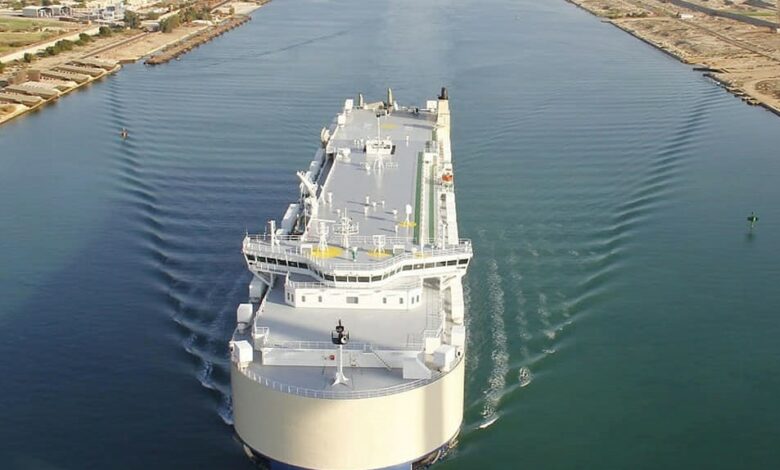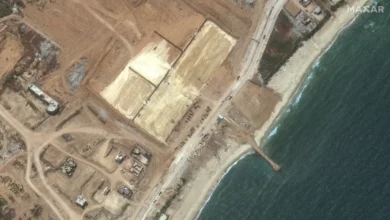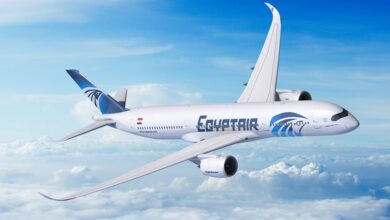
Israel’s media headlines are once again buzzing over plans for the high-speed Israeli railway to Eilat, linking the Red Sea to the Mediterranean and thereby competing with the Suez Canal that brings Egypt about nine billion dollars annually.
This was the introduction of a report by the “Israel Defense” magazine, issued by the Israeli army, about the high-speed train project that Israel once again seeks to revive.
Tel Aviv is heating up its engines against Egypt and the Israeli government is working to compete with the revenues of the Suez Canal with a fast railway linking the Red Sea to the Mediterranean, the writer of the article Ami Rojkes Dombe, said.
A fast freight train from Eilat on the Red Sea to Haifa or Ashkelon, overlooking the Mediterranean, will compete strongly with the Suez Canal and will harm Egypt’s revenues from the canal, he added.
He called the project a strong and live competitor for the prestigious revenues of the Suez Canal.
Israeli Prime Minister Benjamin Netanyahu said that Israel is working to establish a railway linking to Saudi Arabia.
During the weekly cabinet session, Netanyahu spoke about an Israeli project to construct a railway that extends from the settlement of Kiryat Shmona in the north to Eilat in the south.
He added, “In the future, we will be able to transport cargo shipments by train from Eilat to our ports in the Mediterranean. We will also be able to connect Israel by train to Saudi Arabia and the Arabian Peninsula.”
Vital waterway
The Israeli military magazine said that the canal is so important to Egypt that a project to expand parts of the Suez Canal finished after two years of work in July.
The Suez Canal Authority announced accelerated plans to extend a second branch of the canal, after “The Ever Given” container ship ran aground and closed the waterway for six days in 2021.
The canal is a vital waterway for international trade, as nearly 12 percent of world trade and 30 percent of the total global container and commodity traffic valued at more than one trillion dollars pass through it annually.
In the 2022/23 fiscal year, the Suez Canal Authority announced record revenues of $9.4 billion, up from seven billion dollars in the previous year.
The canal’s revenues are an important source of income for Egypt and play a vital role in the country’s economy. Egypt’s annual budget is estimated at about $97 billion – in other words, the Suez Canal’s revenues equal about ten percent of Egypt’s annual budget.
The historical importance of the Suez Canal comes from the fact that in the past, ships circled all of Africa with goods by sea – a lengthy and expensive trip.
It was the digging of the Suez Canal that brought these long expensive journeys to an end.
The canal provides a direct route for sailing between Europe and Asia, and allows passage from the North Atlantic to the Indian Ocean without having to go around the African continent, making it a vital waterway for international trade.
A high-speed rival
According to the magazine, Israel’s plans to establish a high-speed rail route for passengers and goods will link the port of Eilat with the ports of Haifa and Ashkelon, and provide shipping companies with a cheaper route.
Nevertheless, the Israeli land train will have inherent disadvantages compared to the Suez Canal where the shipping of the liner is carried out according to fixed sailing schedules in weekly cycles, the magazine noted.
It added freight customers plan their work throughout the supply chain according to these schedules.
The line which begins in Hong Kong, as an example, passes through other ports in the East, and through the Suez Canal, continues to European ports, and then returns to Hong Kong.
Distribution allows for a regular flow of containers between ports of origin and destination.
While the sea route is continuous – the container is transported continuously by one means of transport, the land bridge is not continuous, as the container passes through independent cycles between the different means of transport.
The land bridge will therefore divide the continuous sea cycle into four sub-cycles, the magazine said.
War is costly
Regarding geopolitics, the Israeli magazine said that in addition to the issue of the efficiency of the railway compared to maritime transport through the Suez Canal, a question arises about how Egyptians will deal with Israel’s desire to compete with them economically.
The train to Eilat project had been previously suspended due to Cairo’s opposition.
But recently, at a cabinet meeting, right-wing minister Miri Regev and Netanyahu pushed the project forward again, according to Israel’s former finance minister Bezalel Smotrich.
There has been a lasting peace agreement between Israel and Egypt for over 40 years, Smotrich said, adding that every year without a war with Egypt saves massive money for the Israeli government.
Moreover, the Israeli army does not need to allocate resources to intensify security at the border with Egypt and build a permanent force against Egypt, he stated.
“Even if we assume that Israel will build a train and manage to take between one and two billion dollars from Egypt’s revenues annually, will it earn more money in the total account? We can assume that Egypt will not declare war against Israel because of that, but it is enough for Cairo to decide to freeze security cooperation with Israel,” Smotrich explained.
Smotrich concluded his talk with the Israeli military magazine, saying: “In conclusion, Israel can do whatever it wants in its sovereign territory that includes Eilat. However, in the economic and geopolitical equation of the Middle East, every step has an economic price.”




